|
|
|
Sort Order |
|
|
|
Items / Page
|
|
|
|
|
|
|
| Srl | Item |
| 1 |
ID:
078775
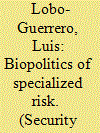

|
|
|
|
|
| Publication |
2007.
|
| Summary/Abstract |
This article offers a biopolitical security analytic of kidnap and ransom (K&R) insurance. It suggests that security phenomena should be analysed in terms of the problematizations through which they are expressed. With reference to Foucault's concept of biopower, K&R insurance is studied as part of a security dispositif designed to deal with the problematic of kidnap risk. The biopolitical security that results is aimed at enabling the circulation of the client should a kidnap event occur. As such, it is a personalized private provision of security premised upon the promotion of an individual's capacity to circulate in the future. Using the story of a kidnap event, the article analyses the micro-practices through which a population of `kidnapping prospects' is created, the underwriting process through which prospective clients undergo a security audit, and the forms of security that derive from this dispositif. It argues that the value of the concept of biopower for security analysis is its potential for explaining problematics that are not circumscribed to a fixed referent object but relate to the emergent features of the changing character of the human being
|
|
|
|
|
|
|
|
|
|
|
|
|
|
|
|
| 2 |
ID:
171881
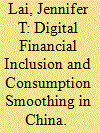

|
|
|
|
|
| Summary/Abstract |
In this paper, we investigate the effect of digital nancial inclusion (DFI) on household consumption smoothing in China. We use four waves of the biennial China Family Panel Studies from 2010 to 2016, during which time DFI has signicantly developed alongside nancial technology across China. We split household income shocks into permanent and transitory components, and evaluate if DFI may help households to buffer against these shocks. We nd that households are not able to insure against permanent shocks to income, but they can smooth approximately 70 percent of transitory shocks to income. We also find that DFI has diminished households’ ability to insure against transitory income shocks. This is partly because online purchase may lead to the oversensitivity of consumption to income. In addition, we nd that contrary to DFI, traditional nancial sector development contributes to better household consumption smoothing against transitory income shocks
|
|
|
|
|
|
|
|
|
|
|
|
|
|
|
|
| 3 |
ID:
106960
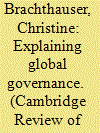

|
|
|
|
|
| Publication |
2011.
|
| Summary/Abstract |
As patterns of global governance have undergone significant changes over time, there is a need for new theoretical concepts that are less oriented towards formal hierarchies and give more emphasis to social processes. A framework, however, that takes account of complex interactions and tangling relations bears the danger of losing analytical power. The article addresses the question of the extent to which complexity theory can overcome this problem by combining scientific rigour with contextual sensitivity. A dynamic mechanistic approach is explored that addresses the underlying processes that generate new collective patterns based on changed actor constellations and relational orders. An activator-inhibitor interaction model is introduced as a framework for analysing the multi-level processes that drive international change, using the example of climate protection. Global governance is theorized as it grows within the system fleshing out a new logic of collective action based on decentralization and clustering.
|
|
|
|
|
|
|
|
|
|
|
|
|
|
|
|
| 4 |
ID:
086820
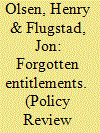

|
|
|
|
|
| Publication |
2009.
|
| Summary/Abstract |
When politicians and policy wonks use the phrase the looming entitlement crisis, most listners know exactly what that means: social security and medicare.
|
|
|
|
|
|
|
|
|
|
|
|
|
|
|
|
| 5 |
ID:
050165
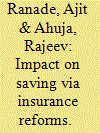

|
|
|
|
|
| Publication |
New Delhi, Indian Council for Research on International Economic Relations, 2001.
|
| Description |
28p.
|
| Series |
Working paper no. 67
|
|
|
|
|
|
|
|
|
|
|
|
Copies: C:1/I:0,R:0,Q:0
Circulation
| Accession# | Call# | Current Location | Status | Policy | Location |
| 044904 | 332.0415/RAN 044904 | Main | On Shelf | General | |
|
|
|
|
| 6 |
ID:
172836


|
|
|
|
|
| Summary/Abstract |
Despite sixty-plus years of technological development, space activities are still ultra-hazardous in nature. These activities range from essential to modern life, like telecommunications, to futuristic and forward thinking, such as space tourism. In order for these activities to not only continue but also develop and grow, their inherent risk must be managed. Political will is lacking at an international level to create new binding rules for activities in space. Likewise, states are reluctant to unilaterally impose stricter, even if ultimately beneficial, regulations on their entities for fear that their domestic industries will flee abroad to greener pastures, creating a regulatory prisoner’s dilemma. States also usually require certain levels of insurance and indemnification to protect themselves against potentially costly mishaps. Likewise, banks and investors will often require insurance to protect their investments, as space business tends to be costly. Thus, a disproportionate amount of responsibility and authority can be transferred to a small number of global space insurers. They may be uniquely positioned to enforce, or at least promote, mechanisms to increase safety and sustainability in the commercial space industry. Increasing safety and sustainability in outer space may help to keep insurance premium costs from growing out of control for these hazardous activities. This article analyzes the sociolegal literature on risk and insurance as governance and applies these concepts to the space sector, considering the possibility that space insurers have become de facto regulators in space and exploring the implications of that possibility.
|
|
|
|
|
|
|
|
|
|
|
|
|
|
|
|
| 7 |
ID:
189465
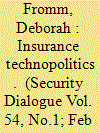

|
|
|
|
|
| Summary/Abstract |
In response to high levels of car theft, insurance companies in São Paulo have developed new systems and technologies for tracking and recovering stolen vehicles. These interventions are driven by an insurance rationality that seeks to manage risk and ensure these companies’ profitability. However, this article draws on the notion of technopolitics to argue that the tracking devices and other technologies mobilized in this way also exercise their own agency. They help to mediate and reorganize the power dynamics and relations between diverse actors who operate within São Paulo’s stolen car market and vehicle recovery processes, presenting both challenges and opportunities for each as they pursue their respective aims. The notion of ‘insurance technopolitics’ emphasizes this conjunction between risk governance and the contingent, technologically mediated relationships and conflicts to which it may give rise.
|
|
|
|
|
|
|
|
|
|
|
|
|
|
|
|
| 8 |
ID:
169785


|
|
|
|
|
| Summary/Abstract |
Insurance, an industry worth 4.6 trillion USD in premium volume in 2016,1 has major effects on how individuals and collectives are governed in the world. With 80 per cent of premiums sold in OECD countries, it is reasonable to argue that the form of governance it facilitates is premised on the liberal forms of life that insurance has been designed to protect.2 If, as argued in the ‘Introduction’, doing a socio-political economy of the globe is indeed possible, the problem of understanding the role of insurance in creating liberal governance in the world, and the possibility of questioning and resisting this process, is certainly an important challenge. This can only be done, as posed by the forum, by integrating the analysis of the political, the economic and the sociocultural, of the everyday and the global, as a single problem space where an integration between IPE and IPS has much to offer. This contribution to the forum focuses on identifying empirical spaces where IPE meets IPS in the problem that results from insurantial practices of governing through risk.
|
|
|
|
|
|
|
|
|
|
|
|
|
|
|
|
| 9 |
ID:
164521


|
|
|
|
|
| Summary/Abstract |
A dynamic multi-stage decision-theoretic approach is introduced to establish the optimal offset and its incidence, the contract price arising from bargaining, and the scale of the acquisition. A new rationale is suggested for offsets in terms of their role as an insurance devise. Results are derived for the pricing of delivery contracts subject to offset claims and their national security implications. It is shown that the national security is strictly convex in the offset transaction. As to the incidence of the offset, the offset claim is shown to be capitalised in the delivery price. The bargaining price is shown to depend on the value of the product to be delivered for the national security, the relative negotiation power of the contracting partners and the social cost of public funds. The analysis highlights the expectation effects of offsets on the bargaining price and the scale of delivery. The results aid in explaining why offsets are widely used in procurement contracts for defence materiel. As they contribute to the national security, they should be allowed to survive and not be denied under competition laws.
|
|
|
|
|
|
|
|
|
|
|
|
|
|
|
|
| 10 |
ID:
172333


|
|
|
|
|
| Summary/Abstract |
When do governments impose costs on foreign firms? Many studies of foreign direct investment focus on incentives for government expropriation, but scholars are often forced to rely on indirect measures of expropriation to conduct empirical analyses. This article introduces a data set which includes information on over 5,000 political risk insurance contracts issued by the US Overseas Private Investment Corporation since 1961, and on all the claims filed by investors under these contracts. These detailed insurance data allow us to study the determinants of foreign investors’ losses from a variety of sources, including expropriation, inconvertibility, and violent conflict. To illustrate the benefits of these data for hypothesis testing, we adopt a comprehensive empirical approach and explore both shared and distinct causes across risk categories.
|
|
|
|
|
|
|
|
|
|
|
|
|
|
|
|
| 11 |
ID:
112737
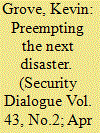

|
|
|
|
|
| Publication |
2012.
|
| Summary/Abstract |
The 2007 launch of the Caribbean Catastrophic Risk Insurance Facility (CCRIF) introduced a new mechanism of state security against the uncertainties of climate change. Proponents argue that increasing the ability of member-states to finance disaster recovery through catastrophe insurance mitigates the effects of increasingly frequent and intense hurricanes and thus contributes to climate change adaptation. In contrast, I offer a critical analysis of the CCRIF that draws out how it facilitates what I call the 'financialization of disaster management'. The introduction of financial logics and techniques enables the state and capital to visualize a population's self-organizing adaptive capacity as both a threat to state-based forms of order and a value that can be leveraged on capital markets as catastrophe risk. Leveraging enhances a state's ability to repair its critical infrastructure and preemptively negate undesirable adaptations. The CCRIF blends risk pooling with parametric insurance techniques to turn the uncertainty surrounding a population's immanent adaptability into catastrophe risks that can be leveraged to enhance state security and capital accumulation in an emergent environment.
|
|
|
|
|
|
|
|
|
|
|
|
|
|
|
|
| 12 |
ID:
099163
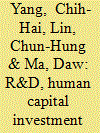

|
|
|
|
|
| Publication |
2010.
|
| Summary/Abstract |
Using firm-level panel data covering 2005-2007, the present paper examines the effects of R&D and human capital investment on productivity in China's electronics industry. It is found that both R&D and on-the-job training positively contribute to total factor productivity (TFP). Firms' investment in employees' health insurance and pensions, which are components of workers' compensation, generate a productivity-enhancing effect, supporting the efficiency wage hypothesis. The estimated impact of R&D on productivity varies among different forms of ownership, and foreign-owned enterprises experience higher R&D efficiency than state or private enterprises. After controlling for potential endogenous causality between TFP and R&D, the above findings remain unchanged. We also find that on-the-job training can improve the quality of human capital and is helpful in promoting productivity. Therefore, establishing indigenous technological capability through various technological sources is quite important, and the government should devote further effort to investing in human capital.
|
|
|
|
|
|
|
|
|
|
|
|
|
|
|
|
| 13 |
ID:
075803
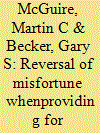

|
|
|
|
|
| Publication |
2006.
|
| Summary/Abstract |
Often an economic agent dissatisfied with an endowed distribution of utilities desires to optimize this distribution by transferring income or resources across individuals or states of the world. This multi?state optimization theme recurs in a wide variety of economic contexts, ranging across taxation and income distribution, international trade and market disruption, labor contracts and unemployment insurance, Rawlsian design of social contracts, provision for retirement, and many others. Because analyses of such topics are frequently so context driven, the generality of this theme seems to have gone unnoticed and, of a particular paradoxical result, unappreciated. One example of this paradox is how lump?sum distribution in a first best environment will reverse the preference rankings of the endowed distribution of utilities - after redistribution the originally 'bad' outcomes become preferred to originally better ones. Or as another example, if fair insurance is available, the rational resource owner will buy so much insurance that the otherwise 'bad' contingency becomes preferred. This paper examines the underlying structure common to such contexts.
|
|
|
|
|
|
|
|
|
|
|
|
|
|
|
|
| 14 |
ID:
142028


|
|
|
|
|
| Summary/Abstract |
This study investigates the impact of short-term precautionary selection and insurance on household decisions with respect to their participation in different saving mechanisms in rural Vietnam. A two-part model is used for the analysis and, unlike other studies, this paper investigates household decisions on participation in, and contribution, to formal and informal saving intermediaries. Furthermore, this study controls for the endogeneity of short-term precautionary motives and insurance in a household contribution model. This paper’s findings suggest that short-term precautionary motives reduce the probability of a household engaging in formal and informal saving intermediaries. In addition, insurance is found to be its substitute. Finally, precautionary savings appear to reduce participant deposits into formal saving intermediaries. However, there is no evidence of the effect of the insurance variable on household contributions to saving intermediaries.
|
|
|
|
|
|
|
|
|
|
|
|
|
|
|
|
| 15 |
ID:
097970


|
|
|
|
|
|
|
|